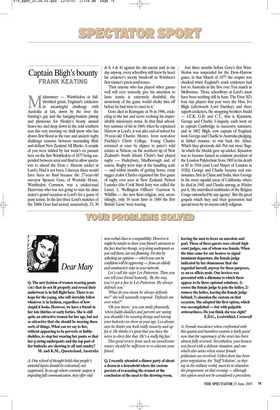Captain Bligh’s bounty
FRANK KEATING
Midsummer — Wimbledon at fullthrottled grunt, England’s cricketers in meaningful challenge with Australia at last, down by the river the bunting’s gay and the hanging-baskets plump and plenteous for Henley’s hearty annual heave-ho, and deep down in the cold southern seas this very morning we shall know who has drawn first blood as the rare and ancient rugby challenge resumes between marauding Brits and defiant New Zealand All Blacks. A couple of you were tickled by last week’s en passant here on the first Wimbledon of 1877 being suspended between semi and final to allow spectators to attend the Eton v. Harrow cricket at Lord’s. Had it not been, I daresay there would have been no final because the 27-year-old surveyor Spencer Gore, of Westside House, Wimbledon Common, was a cricket-mad Harrovian who was not going to miss his alma mater’s grand occasion at Lord’s for a game of puny tennis. In the last three Lord’s matches of the 1860s Gore had scored, successively, 33, 30 & 0, 4 & 41 against the old enemy and, in my day anyway, every schoolboy still knew by heart his cricketer’s snooty brush-off in Wimbers’s first winner’s press conference: ‘That anyone who has played other games well will ever seriously give his attention to lawn tennis is extremely doubtful; the monotony of the game would choke him off before he had time to excel in it.’ Gore died in Ramsgate at 56 in 1906, cricketing to the last and never realising his imperishable missionary status. In that final schoolboy summer of his in 1869, when he captained Harrow at Lord’s, it was also end-of-school for 19-year-old Charles Monro, from next-door Finchley’s Christ College. Young Charles returned at once by clipper to pater’s wild estates at Nelson, on the northern tip of New Zealand’s South Island. Christ’s had played rugby -— Haileybury, Marlborough and, of course, Rugby were tops at the handling code — and within months of getting home, crazy rugger zealot Charles organised the first game of rugby ever seen in New Zealand: Nelson Lunatics (the Cook Strait ferry was called the Luna) 3, Wellington Officers’ Garrison 0. Wildfire — the new Kiwi religion, and, astonishingly, only 18 years later in 1888 the first British ‘Lions’ were touring. Just three months before Gore’s first Wimbledon was suspended for the Eton–Harrow game, in that March of 1877 the empire was shocked when England’s crack cricketers had lost to Australia in the first ever Test match in Melbourne. Those schoolboys at Lord’s must have been seething still in June. The Eton XI’s four star players that year were the Hon. Ivo Bligh (afterwards Lord Darnley) and three superb cricketers, the strapping brothers Studd — J.E.K, G.B. and C.T., that is Kynaston, George and Charlie. Uniquely, each went on to captain Cambridge in successive summers, and in 1882 Bligh, now captain of England, took George and Charlie to Australia pledging, in fabled manner, to win back the Ashes. Which they gloriously did. Put out more flags. At which the Studds gave up cricket. Kynaston was to become famed as eminent president of the London Polytechnic from 1903 to his death at 85 in 1944 (and Lord Mayor of London in 1928); George and Charlie became real missionaries, first in China and India, then George in the more squalid areas of California, where he died in 1945; and Charlie among, as Wisden put it, ‘the uncivilised multitudes of the Belgian Congo untouched by any agency’. But the great gospels which they and their generation had spread were by no means solely religious.


































































 Previous page
Previous page